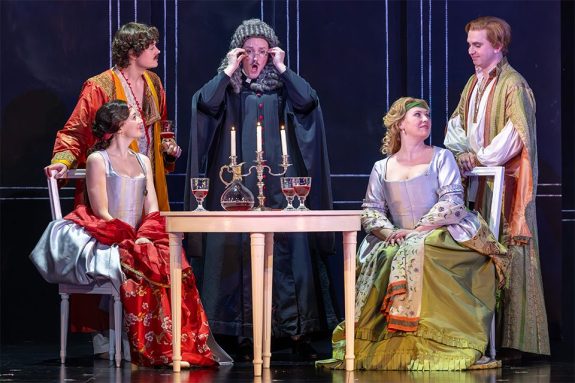 United Kingdom Mozart, Così fan tutte: Soloists, Chorus and Orchestra of Opera North / Clemens Schuldt (conductor). Lyric Theatre, The Lowry, The Quays, Salford, 21.3.2024. (MC)
United Kingdom Mozart, Così fan tutte: Soloists, Chorus and Orchestra of Opera North / Clemens Schuldt (conductor). Lyric Theatre, The Lowry, The Quays, Salford, 21.3.2024. (MC)

Production:
Stage director – Tim Albery
Set and Costume design – Tobias Hoheisel
Lighting design – David Finn
Chorus master – Anthony Kraus
Cast:
Fiordiligi – Alexandra Lowe
Dorabella – Heather Lowe
Ferrando – Anthony Gregory
Guglielmo – Henry Neill
Despina – Gillene Butterfield
Don Alfonso – Quirijn de Lang
Mozart’s opera buffa in two acts Così fan tutte (Women are all the same) has a libretto by Lorenzo da Ponte. It is a preposterous plot about love and deception, honour and loyalty containing many of the composer’s most irresistible arias and ensembles. Da Ponte’s libretto is original and tells the tale of comrades-in-arms Guglielmo and Ferrando who test the fidelity of their fiancées, the sisters Fiordiligi and Dorabella, for a wager with old philosopher Don Alfonso. At the behest of Alfonso the two men disguise themselves as Albanians in an attempt to seduce the sisters. Così fan tutte has a libretto packed with sparkling humour and pathos yet soon after its premiere in 1790 at Burgtheater, Vienna it failed to find favour with audiences for around a century.
A major reason for this unpopularity was in nineteenth-century Vienna the plot of swapping fiancées was frowned upon, even deemed immoral. Gradually becoming wider known by around the end of the Second World War Così fan tutte had gained in popularity, achieving a place in standard operatic repertoire. According to the last operabase.com records it was the fifteenth most performed opera worldwide. I tend to experience Così fan tutte as too wordy and overlong, yet this doesn’t prevent me from enjoying the opera.
With this Così fan tutte (sung in English translation) vastly experienced stage director Tim Albery and his design team were reviving their twenty-year-old Opera North production from 2004. Narrowing the expansive stage, set and costume designer Tobias Hoheisel created an ideal mini-set that was traditional in looks and straightforward with a minimum of props leaving an uncluttered stage. Even the chorus couldn’t be seen on stage and was heard from backstage. Hoheisel’s period costumes were striking, however, I doubt the stage lighting did justice to the vibrant colours.
Albery might have specified more animated performances, however, it didn’t prevent his cast of six soloists from displaying accomplishment in their roles. Giving a stellar performance was Quirijn de Lang as the old philosopher Don Alfonso, a character insightfully described as an ‘agent provocateur’ or ‘observer’. It was he who devised the day-long fidelity test. An assured singer and actor the role of Alfonso might have been made for the stylish De Lang and his experience of singing some seventy opera roles shone through as he always seemed entirely engaged. Alfonso has no standalone arias, yet De Lang used his undoubted ability for recitative to substantial effect.

At the Royal Northern College of Music in 2015 I first reported on soprano Alexandra Lowe (no relation to Heather) in a performance of Kurt Weill’s Street Scene. My review declared how Alexandra as Rose Maurrant had stolen the show. Here in the role of Fiordiligi, the more earnest and oldest of the two sisters, Alexandra has continued her progress giving an adept and elegant performance together with first-rate stagecraft. Displaying such an agreeably warm voice in Fiordiligi’s much admired arias Come scoglio and Per pietà, both challenging and requiring a broad range, they were beautifully produced without strain.
Mezzo-soprano Heather Lowe sang the role of Dorabella who she portrayed as the more emotional of the sisters yet remained dignified. Enjoyable were Dorabella’s arias Smanie implacabili and É amore un ladroncello sung by Heather with elegance and a touch of vulnerability. Taking the part of the amiable Ferrando was Anthony Gregory a lyric tenor. Gregory’s splendid rendition of the glorious aria Un’aura amorosa provided well phrased singing combined with an attractive and tender tone. Baritone Henry Neill in the role of Guglielmo was a character that oozed confidence in Non siate ritrosi and in Donne mie demonstrated resentment. All in all, Neill sang well and didn’t put a foot wrong.
A member of the Opera North chorus for eighteen years, soprano Gillene Butterfield was suited to the role of Ladies maid Despina. Brought on board to assist Alfonso with the fidelity test Despina disguised herself in clothes and voice, as both a doctor and notary. As a feisty Despina, Butterfield attained a sense of an old head on young shoulders and her aria Una donna a quindici anni, explaining how young women should be able to flirt, with its low notes was capably sung.
Throughout I was enamoured by the substantial series of ensembles that were so auspiciously performed and a real credit to the cast. With convincing levels of unison and an outstanding level of colourful expression the Orchestra of Opera North excelled under conductor Clemens Schuldt who kept matters moving along at a pace that I found ideal. Hidden away backstage the Opera North chorus coached by Anthony Kraus sounded in fine voice.
Everything had been satisfactorily in place using a compact set and period costumes, and together with a talented cast combined to make this an eminently enjoyable production. In summary this Opera North revival of Tim Albery and Tobias Hoheisel’s production of Così fan tutte was given a most accomplished performance.
Michael Cookson
